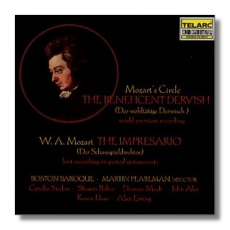
The Internet's Premier Classical Music Source
Related Links
- Mozart Reviews
- Latest Reviews
- More Reviews
-
By Composer
-
Collections
DVD & Blu-ray
Books
Concert Reviews
Articles/Interviews
Software
Audio
Search Amazon
Recommended Links
Site News
 CD Review
CD Review
Wolfgang Mozart

The Impresario
"Mozart's Circle" - The Beneficent Dervish
- Cyndia Sieden (Madame Herz)
- Sharon Baker (Mademoiselle Silberklang; Zenomide)
- John Aler (Monsieur Vogelsang)
- Kevin Deas (Buff; Mandolino)
- Alan Ewing (Dervish)
- Deanna Meek (Mandolina)
Boston Baroque/Martin Pearlman
Telarc CD-80573 DDD 66:14
- Cyndia Sieden (Madame Herz)
- Sharon Baker (Mademoiselle Silberklang; Zenomide)
- John Aler (Monsieur Vogelsang)
- Kevin Deas (Buff; Mandolino)
- Alan Ewing (Dervish)
- Deanna Meek (Mandolina)
Telarc CD-80573 DDD 66:14
Here's news indeed. Martin Pearlman and Boston Baroque have beaten others to the punch and recorded the first Impresario (or, to give it its German title, Der Schauspieldirektor) on period instruments. That's interesting enough, but the last two-thirds of the disc are devoted to a Singspiel never recorded at all, and probably not even performed since 1791: The Beneficent Dervish (or Der wohltätige Derwisch).
A Singspiel is a stage work, frequently a comedy, in which musical numbers alternate with long stretches of spoken dialogue. (The dialogue is omitted on this recording, and that's probably for the best.) It is an ancestor of the operetta. We don't know who composed the music to The Beneficent Dervish. While it wasn't Mozart, the composer probably was someone with whom Mozart was well acquainted, and it might have been one (or more) of his collaborators on The Philosopher's Stone, a Singspiel also given its première recording by Boston Baroque (Telarc 2CD-80508). We know that the librettist was Emanuel Schikaneder, who also wrote the libretti for The Philosopher's Stone and Mozart's The Magic Flute, and whose company premièred all three of these works. The Beneficent Dervish, then, is a work that Mozart almost certainly knew, and – consciously or not – was influenced by as he wrote The Magic Flute. Even if Mozart had known nothing about it, however, it still is fascinating to recapture a slice of Viennese theater that is more than 200 years old.
The plot bears superficial resemblances to The Magic Flute and is too complicated to recount here. It includes a Sarastro-like father who, disguised as a dervish, assists his royal son in overcoming adversity. The ending, in which two femmes fatales are cursed to live the rest of their lives sporting elephantine noses, borders on slapstick. The dervish choruses whose texts are a mixture of baby talk, nonsense, and phony Turkish are worth a plateful of giggles. As for the music, this is the sort of stuff that Mozart could have written between sets down at the bowling alley, and I mean that as praise. The Beneficent Dervish is no long-lost masterpiece, but it is charming through and through, and every bit as good as it needs to be. No apologies need to be made, just because Mozart didn't write it.
Pearlman has assembled a perfect cast for these enjoyable trifles; most of the singers do double duty. I was particularly pleased to hear John Aler, a tenor who came into prominence in the mid-1980s whose voice is still caressing and whose concern for style still keen. Sharon Baker excels in the empty coloratura of Mademoiselle Silberklang (Impresario) and in the sweet deception of Zenomide, the Princess of Basora (Dervish). Bass Alan Ewing appears only in the latter opera, but there in the title role. His voice, while flexible, bespeaks authority, and its attractively burry quality reminds me of Maria Callas's voice, of all things. In a cast that has no weaknesses, he is a particularly strong link. Pearlman and Boston Baroque execute their duties with quiet skill and musicianship. Period-instrument performances rarely sound the full-bodied and confident.
Telarc's booklet offers texts and translations of both works. The venue was Mechanics' Hall in Worcester, Massachusetts – a sonically superior location of which Telarc has taken the fullest advantage.
Strongly recommended!
Copyright © 2002, Raymond Tuttle




















